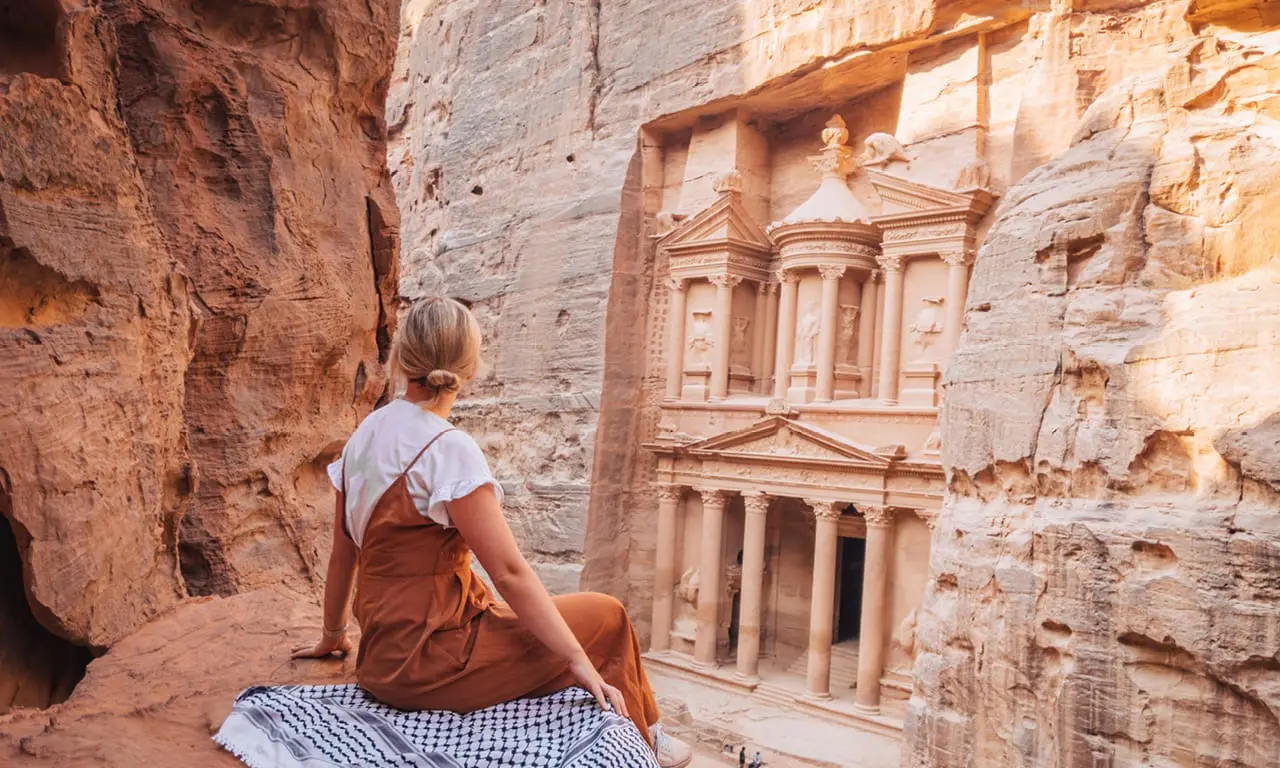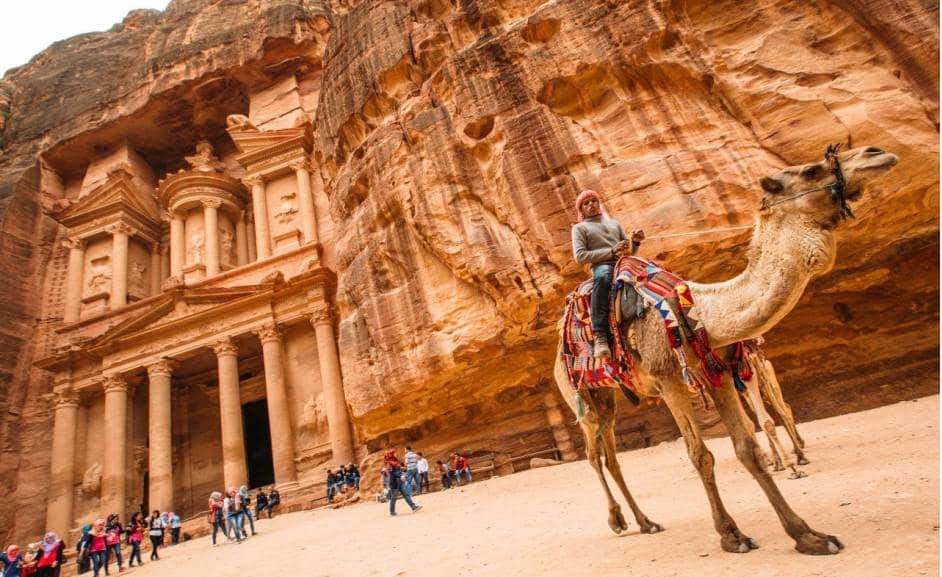In Search of Lost Civilizations: Egypt and Jordan Tours for UK Explorers

Introduction
Overview of Egypt and Jordan Tours
When you think of Egypt and Jordan, what comes to mind? Perhaps the towering Pyramids of Giza or the breathtaking rose-red city of Petra? These countries are not just geographical locations; they're gateways into the past, rich with history and fascinating stories waiting to be told. Tour packages that combine both Egypt and Jordan promise a memorable adventure where ancient civilizations come alive through your exploration.
Most itineraries typically include:
- Cairo: Home to the magnificent pyramids and the bustling bazaars.
- Luxor: Often dubbed the world’s greatest open-air museum, filled with temples and tombs.
- Petra: A UNESCO World Heritage Site that enchants all who visit with its stunning rock-cut architecture.
Each tour allows you to delve into the narratives of these lost civilizations, making it a trip of discovery and education.
Purpose of Exploring Lost Civilizations
The allure of lost civilizations lies in their mysteries, their achievements, and their cultural legacies that shape our present. By exploring these ancient worlds, you gain a deeper understanding of human ingenuity and resilience. Imagine walking through the Valley of the Kings or gazing at the intricate carvings in Petra—it's like stepping into a history book.
The exploration of these lost cultures serves multiple purposes:
- Cultural Appreciation: Understand the traditions and contributions of ancient societies.
- Historical Insight: Learn about the rise and fall of great empires.
- Personal Growth: Engage with narratives that inspire self-reflection and curiosity about our own cultures.
Embarking on this journey isn't just a holiday; it's a transformative experience connecting you with the echoes of our shared past.

Ancient Egyptian Civilization
History and Architecture
Stepping into the realm of Ancient Egypt is like opening a treasure chest of fascinating histories. Emerging around 3100 BC, this remarkable civilization thrived along the Nile River, creating a complex society defined by its rich culture, innovative technology, and intricate social structures.
One of the most captivating aspects is the architecture, which not only reflects the technological prowess of the Egyptians but also serves as a testament to their religious beliefs. Some key architectural marvels include:
- Temples: Magnificent structures dedicated to the gods, featuring colossal columns and vibrant wall carvings.
- Tombs: Elaborate burial sites, particularly the iconic pyramids, designed to honour and preserve the afterlife for pharaohs.
These architectural feats are more than just buildings; they are deeply entwined with the spirituality and identity of Ancient Egypt.
Famous Landmarks: Pyramids, Sphinx
You simply cannot discuss Ancient Egypt without mentioning the Great Pyramids of Giza and the enigmatic Sphinx. These landmarks are the crown jewels of Egypt's timeless civilization.
- The Great Pyramid of Giza: Constructed around 2580–2560 BC, it stands as the last of the Seven Wonders of the Ancient World. Picture the sheer scale and precision—an architectural wonder that still baffles modern engineers!
- The Sphinx: Guarding the pyramids, this half-lion, half-human statue is shrouded in myths and legends, igniting the imagination of those who seek to understand its secrets.
Exploring these sites evokes a sense of wonder as you walk in the footsteps of the ancients, pondering their incredible achievements and enduring legacy.

Jordanian Civilization
Petra: The Rose City
Nestled amid rugged cliffs in southern Jordan lies Petra, often dubbed "The Rose City" due to the stunning pink hue of its rock formations. This remarkable UNESCO World Heritage Site is not just a place but an experience that feels like stepping back in time. As you walk through the narrow Siq—an enchanting canyon leading to the heart of Petra—you can almost hear the whispers of ancient traders and explorers.
Visiting Petra invites you to:
- Marvel at Al-Khazneh (The Treasury): This breathtaking façade, carved directly into the rock face, is perhaps the most iconic sight in Petra, dazzling visitors with its intricate designs.
- Explore the Monastery (Ad Deir): A vigorous climb up 800 steps rewards you with panoramic views and a striking Hellenistic architecture that rivals the Treasury.
Nabataean Culture and History
But what is truly captivating about Petra is its connection to the Nabataeans—an industrious Arab tribe that thrived in this area over 2,000 years ago. The Nabataeans were masterful traders and talented engineers, using their environmental knowledge to build a city that flourished amidst the arid desert.
Some key features of Nabataean culture include:
- Water Management Systems: Ingeniously crafted cisterns and aqueducts that facilitated water collection and storage, vital for survival in the desert.
- Trade Networks: Petra served as a major hub for spice and silk trade routes that connected the East and West.
Understanding Nabataean culture not only enriches your visit to Petra but also provides insight into the resourcefulness and resilience of a people who thrived in a challenging landscape, making their dreams a tangible reality.

Tourist Attractions
Luxor: The World's Greatest Open-Air Museum
Continuing your exploration of Egypt and Jordan, Luxor proudly claims its title as "The World's Greatest Open-Air Museum." Imagine wandering through a sprawling archaeological treasure trove filled with magnificent temples, tombs, and monuments that narrate the extraordinary history of Ancient Egypt.
As you stroll along the East and West banks of the Nile, you'll encounter:
- Karnak Temple Complex: This vast site features towering columns and obelisks with intricate hieroglyphics that tell stories of gods and kings.
- Valley of the Kings: Home to the tombs of famous pharaohs, including Tutankhamun, this is where you can marvel at the stunning wall paintings and the elaborate burial rituals.
Each step in Luxor immerses you deeper into the ancient world, making it feel as though time has stood still.
Wadi Rum Desert Adventure
Transitioning from the temples to the breathtaking landscapes of Wadi Rum, your adventure continues in Jordan’s spectacular desert. Known as “The Valley of the Moon,” Wadi Rum boasts dramatic sandstone mountains and unique rock formations, showcasing stunning sunsets that paint the sky in vibrant hues of orange and pink.
Your journey here can include:
- Jeep Tours: Exploring the dunes and rock formations, you might find ancient petroglyphs, evidence of the people who once inhabited this jaw-dropping area.
- Camel Rides: Embrace the traditional mode of transport and enjoy the sights while learning about the Bedouin culture that thrives in this rugged landscape.
Whether you’re hiking up the natural arches or simply stargazing at night, Wadi Rum offers an unforgettable experience that beautifully complements your historical journey through Luxor, creating a dynamic blend of nature and history.

Exploring Culture and Traditions
Egyptian Mythology and Beliefs
As you delve deeper into the wonders of Egypt and Jordan, you can't overlook the fascinating tapestry of Egyptian mythology and beliefs that defined the ancient world. The Egyptians were deeply spiritual, believing in a pantheon of gods and goddesses who influenced every aspect of life and death.
Key mythological figures include:
- Ra: The sun god, symbolising light and life, who was often depicted sailing across the sky.
- Osiris: God of the afterlife, he represented resurrection and was central to the beliefs about life after death.
- Isis: The divine mother and protector, who embodied compassion and magic, captivating artisans with her stories.
These deities played a pivotal role in the Egyptian worldview, influencing monumental architecture, rituals, and art forms that you’ll encounter on your journey, enhancing your appreciation for their legacy and beliefs.
Bedouin Hospitality in Jordan
Transitioning to Jordan, you’ll encounter the warm and welcoming hospitality of the Bedouin people. Renowned for their generosity, the Bedouins embody a culture steeped in tradition and community, offering visitors a chance to experience their way of life.
Notable aspects of Bedouin hospitality include:
- Traditional Meals: Sharing a meal, often featuring delicious dishes such as mansaf (a lamb and rice dish), becomes a celebration of friendship and camaraderie.
- Tea Ceremonies: Enjoying a cup of sweet mint tea is a significant ritual, symbolising acceptance and warmth, allowing you to connect more deeply with your hosts.
Experiencing Bedouin hospitality not only enhances your journey but also fosters a sense of connection to the local culture. Engaging with both Egyptian mythology and Bedouin traditions invites you to appreciate the rich tapestries of history that shape the lives of those in these captivating regions.
Practical Tips for UK Explorers
Visa and Travel Requirements
As you prepare for your exciting journey through Egypt and Jordan, it's essential to get familiar with the visa and travel requirements for UK travellers. Egypt and Jordan are both welcoming to tourists but have specific entry regulations that you should be aware of.
For Egypt, tourists can typically obtain a visa on arrival or apply for an e-visa ahead of time. Here are the key details to consider:
- Visa on Arrival: Available at major airports for stays up to 30 days, costing around $25.
- E-Visa: Allows for a more streamlined entry process; apply online before your trip for a valid 30-day visa.
In Jordan, UK citizens can enjoy the following:
- Visa on Arrival: Valid for 30 days and generally issued at the airport for a fee of approximately 40 JD.
- Tourist Cards: A popular alternative if you plan to visit Petra or Wadi Rum, providing easier access to sites.
Safety and Cultural Etiquette
Safety is another crucial aspect when travelling abroad. Both Egypt and Jordan are generally safe for tourists, but it's wise to stay alert and informed.
Some tips to consider:
- Stay Updated: Regularly check travel advisories from the UK government.
- Respect Local Customs: Dress modestly when visiting religious sites, and always ask for permission before taking photos of locals.
Understanding cultural etiquette goes a long way in making your interactions more meaningful. For example, learning a few Arabic phrases can help bridge the gap and show respect.
Embracing these practical tips not only enhances your travel experience but also ensures a more enjoyable and culturally rich adventure through the enchanting landscapes of Egypt and Jordan.

Recommended Itinerary
10-Day Egypt and Jordan Tour Plan
Planning a 10-day tour through Egypt and Jordan promises an unforgettable adventure, filled with rich histories and breathtaking landscapes. Here’s a suggested itinerary to help you make the most of your journey:
Day 1-3: Cairo
- Arrive at Cairo International Airport.
- Explore the Pyramids of Giza and the Sphinx.
- Visit the Egyptian Museum, home to Tutankhamun's treasures.
Day 4: Luxor
- Fly to Luxor.
- Visit the Karnak Temple and the Valley of the Kings.
Day 5-6: Aswan
- Journey south to Aswan to see the High Dam and Philae Temple.
- Take a relaxing felucca ride on the Nile.
Day 7: Fly to Amman
- Travel to Jordan's capital, Amman.
- Explore the Roman Theatre and the Citadel.
Day 8: Petra
- Venture to Petra and spend the day discovering its wonders.
- Experience the magical sunset at the Monastery.
Day 9: Wadi Rum
- Discover the stunning desert landscapes of Wadi Rum.
- Enjoy a night under the stars in a Bedouin camp.
Day 10: Departure
- Return to Amman for your departure.
Optional Extensions and Add-Ons
To enhance your journey, consider some optional extensions:
- Nile River Cruise: Add a 3-day cruise between Luxor and Aswan for a leisurely experience along the Nile.
- Dead Sea Visit: Spend a day relaxing and floating in the unique waters of the Dead Sea, famous for its therapeutic properties.
- Aqaba: Extend your trip to the Red Sea and enjoy activities like snorkelling and diving in vibrant coral reefs.
Incorporating these add-ons can enrich your travel experience, creating lifelong memories and deepening your connection with both Egypt and Jordan. Each day of your tour reveals new stories and adventures just waiting to be discovered!
Preserving Archaeological Sites
Efforts to Protect Historical Treasures
As you wander through the archaeological wonders of Egypt and Jordan, it’s important to remember that these awe-inspiring sites need our support to remain intact for future generations. Both countries have implemented various strategies to protect their invaluable historical treasures.
Key efforts include:
- Restoration Projects: Continuous restoration work is underway at sites like the Pyramids and Petra, ensuring that structural integrity is maintained.
- Strict Regulations: National governments have set guidelines to regulate excavation activities and tourism, minimizing human impact on these delicate environments.
- Educational Campaigns: Initiatives aimed at educating locals and visitors about the significance of these sites promote a shared responsibility for their preservation.
These combined efforts illustrate a commitment to safeguarding history while allowing visitors to appreciate the splendour of ancient civilizations.
Sustainable Tourism Practices
In tandem with protective measures, sustainable tourism practices are becoming vital in preserving archaeological sites. Here’s how you can play a part in this movement during your travels:
- Choose Eco-friendly Tours: Opt for tour operators that prioritize sustainable practices, such as minimal waste generation and local engagement.
- Respect Site Regulations: Follow guidelines regarding photography, paths, and periphery zones to protect the environment and heritage.
- Support Local Economies: Purchase locally-made crafts and foods, ensuring that your travel benefits the community.
By engaging in sustainable tourism, you not only enrich your own travel experience but also contribute to the ongoing preservation of the remarkable historical treasures that have shaped our world. Together, we can help maintain these sites for generations to come.

Conclusion
Significance of Lost Civilizations Exploration
Exploring lost civilizations like those of Egypt and Jordan is not merely an act of sightseeing; it serves as a vital link to our collective past. The treasures you discover—be it the awe-inspiring pyramids or the intricate carvings of Petra—tell stories that are essential to understanding human history. Through their monumental achievements and cultural richness, these ancient societies offer insights into:
- Human Innovation: Witnessing the engineering feats of the pyramids or the sophisticated water systems of Nabataeans highlights the ingenuity of our ancestors.
- Cultural Diversity: These civilizations remind us that rich and varied cultures existed long before us, shaping the world we live in today.
- Shared Heritage: Recognising the common threads that run through humanity's history fosters a sense of connection across time and geography.
Inspiration for Future Expeditions
As your travels through these remarkable regions come to a close, the influence of these lost civilizations lingers on, igniting a passion for exploration. The lessons learned and the experiences gained may inspire your next adventure, whether it involves a rediscovery of lesser-known sites or a deeper dive into different cultures.
Consider:
- Finding Hidden Gems: Seek out sites that are off the beaten path—the lesser-known ruins or local traditions that await your discovery.
- Creating Cultural Connections: Engage with communities to learn their stories and preserve their heritage.
Ultimately, each expedition not only enriches your understanding of history but also empowers you to contribute positively to the world around you. Let the wonders of Egypt and Jordan remind you that the journey of exploration is an ongoing adventure that holds the potential for inspiration and growth.
